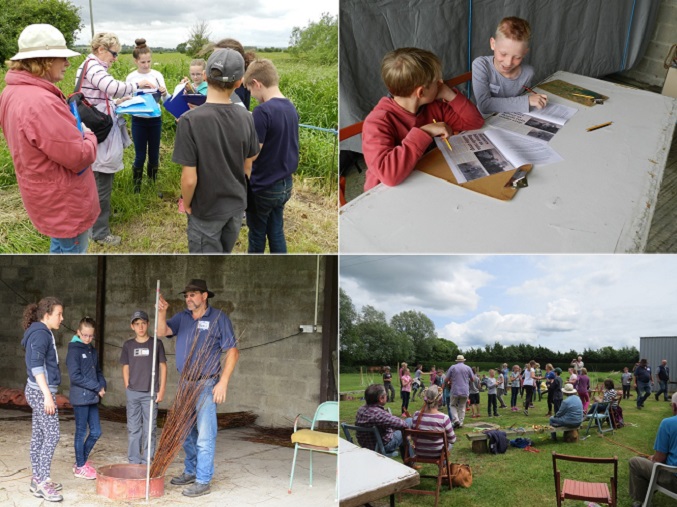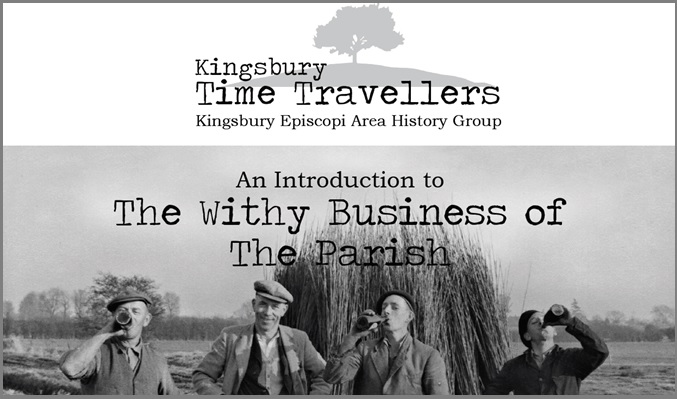by Adrian Wills
The Kingsbury Time Travellers, a local history group, formed about two years ago with the aim of archiving documents, photographs and videos from and of the parish of Kingsbury Episcopi, Somerset. The parish has a quite distinct geographical context and sits at the heart of the willow growing region of the Somerset levels. Its social and economic history and development are closely related to a variety of agricultural activities – the growing of withies (willow) for basketmaking, apples for cider, fodder crops, fruit and vegetables, and sheep, beef and dairy farming. It had a glove making factory which, until relatively recently, employed up to 50 women in the parish. It encompassed a number of the most ancient working activities – leatherworking, pottery, basketmaking, eel fishing on the River Parrett, and the use of the apple for cider making. This heritage is still very much a part of current activity and practised tradition manifested in various community undertakings and projects.
Since 2015 the Kingsbury Time Travellers have engaged in a number of active projects. We use our Facebook page to connect with local families who live, or have lived, in the parish, and to organise public events where we show archive material. More significantly, we are creating a conversation about the lives of people in the parish, past and present. Subsequently things – and people – turn up. We aim to create an ongoing digital archive and, in a very short time, have amassed a large number of photographs, documents, and old film footage, and have made dozens of short films of local people telling their stories.
Our latest event, held on 7th June, was designed for Year 6 pupils from our local primary school. The event took place at Lockleaze, the home of Brian and Betty White, whose family, the Locks, have been working with withies since the early 1920s. The site looks as if the last lorry of withies only left yesterday, and it retains the boiler, air driers, pitting beds, barns, and belt-driven willow-stripping machines.

An action-packed day for Year 6 pupils at the ‘Withies in the Curriculum’ event. Clockwise from top left: Poetry writing on Westmoor; looking at secondary evidence in old newspapers; sorting willow with Mr Maurice; dancing ‘Strip the Willow’ with caller Keith Stevens.
Nicola and Jonathan Coate of Coates English Willow supplied us with materials for the day. We supplied local people who had spent a lifetime on the moors, including Betty and Brian, Les and Hugh Male (the Males were another willow growing family), and ‘Mr Maurice’ Fawcett, whose enthusiasm and dedication to withies is the main reason why the tradition and its practice are so active in the parish. Every year our May Festival celebrations include a community-wide, hands-on ‘withy workshop’, connecting people with withy practice. This ‘Withies in the Curriculum @ Lockleaze’ event dovetailed with this work, and gave us a whole day to combine willow with maths, dance, poetry, maps and historic archive films and photos. You can watch some short videos from the event on our Facebook page.
We are submitting an application to the Heritage Lottery Fund under their ‘World War One: Then and Now’ grants programme for our project ‘WW1 and the People of the Parish’. Kingsbury Episcopi is unusual in that several families have remained in the parish over many generations. This means we have been able to contact local, living relatives of the men whose names are on the World War One memorials, many of whom had connections to the willow growing industry, and record their stories through short videos, photographs, documents and artefacts. We have been able to find photographs of the men, find out where they lived, and archive stories about them. Our HLF bid includes workshops to develop this community, and an education programme working with withies. We’re very grateful to Basketry Then and Now and the Everyday Lives in War Centre for supporting our application.





